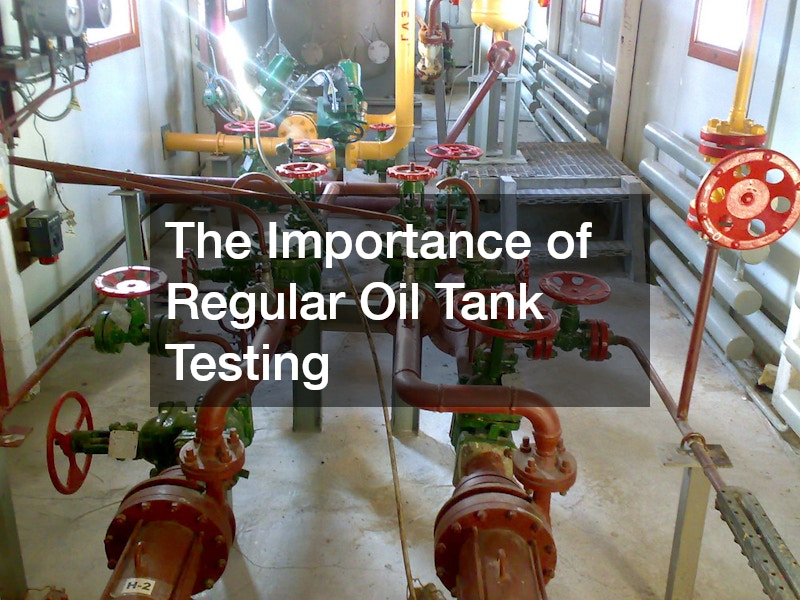
The Importance of Regular Oil Tank Testing
In many homes and businesses across the country, oil tanks serve as a crucial source of fuel. However, like any piece of equipment, they require regular maintenance to operate efficiently and safely. One essential maintenance practice is regular oil tank testing. This ensures that the tanks are functioning correctly and not posing any risk to your property or the surrounding environment.
In this article, we will explore why regular oil tank testing is so important, the potential risks of neglecting it, and the benefits it brings to homeowners and business operators alike.
Oil tank testing might not be a top priority for many until it’s too late. An undetected issue with the oil tank can lead to serious environmental contamination or even health hazards. Regular testing helps identify these issues before they escalate into bigger problems, saving you time, money, and potential legal repercussions. Understandably, some may question the necessity of these checks, but the peace of mind they offer is invaluable. Through careful analysis and testing, any flaws or weaknesses in the tank can be identified and rectified promptly.
Regular testing of oil tanks is not only about protecting your immediate environment but also about adhering to legal and environmental standards. Many local and state regulations require regular testing to ensure compliance with safety and environmental laws. Neglecting this critical task could lead to hefty fines and penalties. Moreover, it is a sound practice that could potentially enhance the longevity of the tank, providing uninterrupted service for years to come. Therefore, cultivating a habit of regular oil tank testing is not just a responsible act but a necessity in today’s eco-conscious world.
The Risks of Neglecting Oil Tank Testing
One of the most significant risks of ignoring regular oil tank testing is environmental contamination. If an oil tank develops a leak, it can result in oil seeping into the ground, leading to soil and water contamination. This kind of pollution can be incredibly harmful to local ecosystems, affecting plants, wildlife, and even local water supplies. The aftermath of such leaks can result in extensive clean-up operations that are both costly and time-consuming. Ultimately, the environmental impact of such negligence serves as a compelling reason for regular testing of oil tanks.
Another concerning risk of neglecting testing is the potential for fires and explosions. An undetected fault in an oil tank can lead to a build-up of flammable gases, which poses a significant fire hazard. In extreme cases, these gas build-ups can lead to explosions that can cause extensive damage to properties and pose serious threats to human safety. Regular oil tank testing helps in identifying such faults early, mitigating the risks of accidents and ensuring that any necessary repairs or replacements are made in a timely fashion. Thus, prioritizing oil tank testing equates to safeguarding lives and properties.
Financially, neglecting regular oil tank testing can result in costly repairs or replacements. An unchecked fault can exacerbate into major structural damage to your tank, leading to complete failure and the necessity for costly replacements. Furthermore, the costs associated with cleaning environmental spills or dealing with fire damage can quickly add up. Additionally, non-compliance with regulations due to neglect might result in fines or increased insurance premiums. By investing in regular oil tank testing, you essentially protect yourself from such financial pitfalls, demonstrating fiscal responsibility in your maintenance practices.
Benefits of Regular Oil Tank Testing
One of the primary benefits of regular oil tank testing is the assurance of safety. Regular checks ensure that any potential hazards are identified and addressed, providing peace of mind to homeowners and business operators. Safety for both people and property should always be a priority, and regular testing delivers reliable data about the condition of the oil tanks. By investing in regular tests, you safeguard those who rely on these heating systems every day. Moreover, consistent maintenance can help in preemptively correcting minor issues before they evolve into major concerns.
Regular oil tank testing is of paramount importance for a variety of reasons. The key benefits of maintaining a consistent testing schedule include preventing environmental pollution, reducing the risks of fire and explosions, and avoiding costly repairs and fines. Furthermore, regular testing contributes to the efficiency of your heating system and ensures compliance with important regulations. By investing in routine checks, homeowners and businesses safeguard their properties, the environment, and their financial health.
As an integral part of a comprehensive maintenance strategy, regular oil tank testing stands as a testament to responsible ownership. The peace of mind that comes with ensuring the operational safety and efficiency of your oil tank far surpasses any associated inconveniences or costs. Thus, it is imperative that individuals and businesses embrace regular oil tank testing as a critical aspect of their properties’ maintenance regimen. Cultivating this habit will yield benefits that extend well beyond the immediate results, forging a path towards safer and more efficient operations.
.


